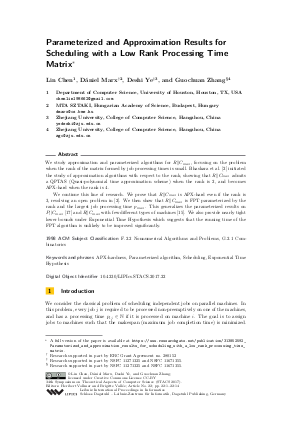Parameterized and Approximation Results for Scheduling with a Low Rank Processing Time Matrix
Authors Lin Chen, Dániel Marx, Deshi Ye, Guochuan Zhang
-
Part of:
Volume:
34th Symposium on Theoretical Aspects of Computer Science (STACS 2017)
Part of: Series: Leibniz International Proceedings in Informatics (LIPIcs)
Part of: Conference: Symposium on Theoretical Aspects of Computer Science (STACS) - License:
 Creative Commons Attribution 3.0 Unported license
Creative Commons Attribution 3.0 Unported license
- Publication Date: 2017-03-06
File

PDF
LIPIcs.STACS.2017.22.pdf
- Filesize: 0.54 MB
- 14 pages
Document Identifiers
Subject Classification
Keywords
- APX-hardness
- Parameterized algorithm
- Scheduling
- Exponential Time Hypothesis
Metrics
- Access Statistics
-
Total Accesses (updated on a weekly basis)
0Document
0Metadata
Abstract
We study approximation and parameterized algorithms for R||C_max, focusing on the problem when the rank of the matrix formed by job processing times is small. Bhaskara et al. initiated the study of approximation algorithms with respect to the rank, showing that R||C_max admits a QPTAS (Quasi-polynomial time approximation scheme) when the rank is 2, and becomes APX-hard when the rank is 4. We continue this line of research. We prove that R||C_max is APX-hard even if the rank is 3, resolving an open problem. We then show that R||C_max is FPT parameterized by the rank and the largest job processing time p_max. This generalizes the parameterized results on P||C_max and R||C_max with few different types of machines. We also provide nearly tight lower bounds under Exponential Time Hypothesis which suggests that the running time of the FPT algorithm is unlikely to be improved significantly.
Cite As Get BibTex
Lin Chen, Dániel Marx, Deshi Ye, and Guochuan Zhang. Parameterized and Approximation Results for Scheduling with a Low Rank Processing Time Matrix. In 34th Symposium on Theoretical Aspects of Computer Science (STACS 2017). Leibniz International Proceedings in Informatics (LIPIcs), Volume 66, pp. 22:1-22:14, Schloss Dagstuhl – Leibniz-Zentrum für Informatik (2017)
https://doi.org/10.4230/LIPIcs.STACS.2017.22
BibTex
@InProceedings{chen_et_al:LIPIcs.STACS.2017.22,
author = {Chen, Lin and Marx, D\'{a}niel and Ye, Deshi and Zhang, Guochuan},
title = {{Parameterized and Approximation Results for Scheduling with a Low Rank Processing Time Matrix}},
booktitle = {34th Symposium on Theoretical Aspects of Computer Science (STACS 2017)},
pages = {22:1--22:14},
series = {Leibniz International Proceedings in Informatics (LIPIcs)},
ISBN = {978-3-95977-028-6},
ISSN = {1868-8969},
year = {2017},
volume = {66},
editor = {Vollmer, Heribert and Vall\'{e}e, Brigitte},
publisher = {Schloss Dagstuhl -- Leibniz-Zentrum f{\"u}r Informatik},
address = {Dagstuhl, Germany},
URL = {https://drops.dagstuhl.de/entities/document/10.4230/LIPIcs.STACS.2017.22},
URN = {urn:nbn:de:0030-drops-70110},
doi = {10.4230/LIPIcs.STACS.2017.22},
annote = {Keywords: APX-hardness, Parameterized algorithm, Scheduling, Exponential Time Hypothesis}
}
Author Details
References
-
Noga Alon, Yossi Azar, Gerhard J. Woeginger, and Tal Yadid. Approximation schemes for scheduling on parallel machines. Journal of Scheduling, 1(1):55-66, 1998.

-
Aditya Bhaskara, Ravishankar Krishnaswamy, Kunal Talwar, and Udi Wieder. Minimum makespan scheduling with low rank processing times. In Proceedings of the Twenty-Fourth Annual ACM-SIAM Symposium on Discrete Algorithms, pages 937-947. Society for Industrial and Applied Mathematics, 2013.

-
Hans L. Bodlaender and Michael R. Fellows. W[2]-hardness of precedence constrained k-processor scheduling. Operations Research Letters, 18(2):93-97, 1995.

-
Vincenzo Bonifaci and Andreas Wiese. Scheduling unrelated machines of few different types. arXiv preprint arXiv:1205.0974, 2012.

- Lin Chen, Klaus Jansen, and Guochuan Zhang. On optimality of exact and approximation algorithms for scheduling problems. Technical report, Christian-Albrechts-Universität Kiel, 2013. Report No. 1303. URL: http://www.uni-kiel.de/journals/receive/jportal_jparticle_00000034.
-
Lin Chen, Deshi Ye, and Guochuan Zhang. An improved lower bound for rank four scheduling. Operations Research Letters, 42(5):348-350, 2014.

-
Lin Chen, Deshi Ye, and Guochuan Zhang. Online scheduling of mixed CPU-GPU jobs. International Journal of Foundations of Computer Science, 25(06):745-761, 2014.

-
Michael R. Gary and David S. Johnson. Computers and intractability: A guide to the theory of NP-completeness, 1979.

-
Michel X. Goemans and Thomas Rothvoß. Polynomiality for bin packing with a constant number of item types. In Proceedings of the Twenty-Fifth Annual ACM-SIAM Symposium on Discrete Algorithms, pages 830-839. Society for Industrial and Applied Mathematics, 2014.

-
Godfrey Harold Hardy, George Polya, and John Edensor Littlewood. Inequalities. Cambridge University Press, 1952.

-
Dorit S. Hochbaum and David B. Shmoys. A polynomial approximation scheme for scheduling on uniform processors: Using the dual approximation approach. SIAM journal on computing, 17(3):539-551, 1988.

-
Russell Impagliazzo, Ramamohan Paturi, and Francis Zane. Which problems have strongly exponential complexity? In Foundations of Computer Science, 1998. Proceedings. 39th Annual Symposium on, pages 653-662. IEEE, 1998.

-
Klaus Jansen. An EPTAS for scheduling jobs on uniform processors: using an milp relaxation with a constant number of integral variables. SIAM Journal on Discrete Mathematics, 24(2):457-485, 2010.

-
Klaus Jansen, Kim-Manuel Klein, and José Verschae. Closing the gap for makespan scheduling via sparsification techniques. arXiv preprint arXiv:1604.07153, 2016.

-
Dušan Knop and Martin Kouteckỳ. Scheduling meets n-fold integer programming. arXiv preprint arXiv:1603.02611, 2016.

-
Jan Karel Lenstra, David B. Shmoys, and Éva Tardos. Approximation algorithms for scheduling unrelated parallel machines. Mathematical programming, 46(1-3):259-271, 1990.

-
Matthias Mnich and Andreas Wiese. Scheduling and fixed-parameter tractability. Mathematical Programming, 154(1-2):533-562, 2015.

-
Thomas J. Schaefer. The complexity of satisfiability problems. In Proceedings of the tenth annual ACM symposium on Theory of computing, pages 216-226. ACM, 1978.

-
Jakob Schikowski. A PTAS for scheduling unrelated machines of few different types. In SOFSEM 2016: Theory and Practice of Computer Science: 42nd International Conference on Current Trends in Theory and Practice of Computer Science, Harrachov, Czech Republic, January 23-28, 2016, Proceedings, volume 9587, page 290. Springer, 2016.

-
Evgeny V. Shchepin and Nodari Vakhania. An optimal rounding gives a better approximation for scheduling unrelated machines. Operations Research Letters, 33(2):127-133, 2005.

-
Craig A. Tovey. A simplified NP-complete satisfiability problem. Discrete Applied Mathematics, 8(1):85-89, 1984.

-
René van Bevern, Robert Bredereck, Laurent Bulteau, Christian Komusiewicz, Nimrod Talmon, and Gerhard J. Woeginger. Precedence-constrained scheduling problems parameterized by partial order width. arXiv preprint arXiv:1605.00901, 2016.

